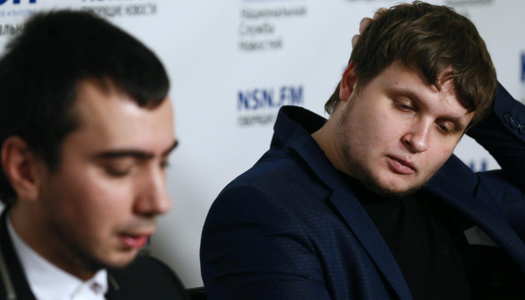
‘If you’re sliding into totalitarianism, you might as well do it glamorously’ Russia’s two most famous pranksters explain themselves
Мы говорим как есть не только про политику. Скачайте приложение.
For several years, the pranksters Vovan and Lexus have been making prank calls to pop stars, public figures, and even presidents, transforming the prank call into an aspect of political life. And, for some reason, their spoofs always seem to serve the interests of Russia’s authorities. For example, in March 2016, Vovan and Lexus handed Nadiya Savchenko a letter purporting to be from officials in the Ukrainian presidential administration with a request to end her hunger strike. Not only did Savchenko believe the authenticity of this letter, but so did her attorneys. One of Savchenko’s lawyer, Mark Feygin, accused the pranksters of having ties to the Russian security services. Vovan and Lexus recently sat down with the Daniil Turovsky, Meduza’s special correspondent, and proclaimed that they have no connections whatsoever to the Kremlin or Russia’s federal police. They did, however, admit their love for Vladislav Surkov, the Kremlin’s former first deputy head, and explained why they’d never prank Ramzan Kadyrov, the head of Chechnya, or Patriarch Kirill, the head of the Russian Orthodox Church.
One spring day in 1989, the phone rang in the apartment of the Muscovite Alexander Bogomolov, a former employee at a computer center. An anonymous voice asked for Katya. Alexander didn’t know who the voice was talking about and he hung up. A while later, an unknown voice called him again. Then again and again. Different voices spoke on the other end and there were more and more. Bogomolov got such calls for 20 years, until he died.
The first caller was Yaroslav, a first-year student at the Moscow Technological University. He called Bogomolov by accident. His friend met a woman named Katya on the street, and she gave him her phone number, but he misremembered it.
The recorded call with Alexander Bogomolov—whose decades-long victimization made him a cult figure in Russia’s prank-caller community—is considered the first documented phony phone call in Russia. From that moment, Bogomolov became Russian pranksters’ primary target. At first, they recorded him on an Electronica-302 tape recorder. The first ten calls came out on a special cassette “album,” which passed through many hands. Bogomolov’s phone number was listed on the tape. Bogomolov changed his number, moved within cities, and sometimes even to new cities, eluding the pranksters sometimes for several years at a time, but they always found him again, using the telephone directory and once even using the prosecutor’s office.
Thanks to this “album,” dozens of people got into pranking, including Russia’s current main telephone hooligans—Vovan (Vladimir Kuznetsov) and Lexus (Alexei Stolyarov). In the first years of their activities, in the late 2000s, they pranked Russian show business stars, like Anastasia Volochkova and Filip Kirkorov, as well as random Russians. Since 2012, Vovan and Lexus have switched to “high-profile clients.” They called Alexander Lukashenko (in June 2014, posing as Yanukovych’s son), Boris Nemtsov (dozens of times in 2012), Elton John (in September 2015, posing as Russian President Vladimir Putin), Recep Erdoğan (in February 2016, they talked with him posing as Ukrainian President Petro Poroshenko), and many others.
For some reason, their political jokes always coincide with the agenda of Russia’s state media and their recordings often air on national television. In mid-March 2016, they pranked the Ukrainian soldier Nadiya Savchenko, whom a Russian court recently sentenced to 22 years in prison for aiding the murder of two Russian journalists in eastern Ukraine. Vovan and Lexus gave one of her lawyers, Mark Feygin, a letter supposedly from Poroshenko’s office, asking her to end her hunger strike. The next day, Savchenko broke off her hunger strike. After learning about prank, Feygin accused the pranksters of working for Russia’s security services.
* * *
Vovan and Lexus sit drinking beer at a corner table in a cafe near the Timiryazevskaya metro station in Moscow. The numbers “1984” are written across Vovan’s t-shirt. “This is a reference to [the writer George] Orwell from [Russian fashion designer] Goshi Rubchinsky,” Vovan explains. “I bought it in Italy because it costs three times more in Moscow. Orwell is famous for writing about totalitarianism. We are against totalitarianism. But if you’re sliding into totalitarianism, you might as well do it glamorously.”
“We in the prankster community have always had a few rules: for example, don’t harm, don’t be rude to the president, and don’t ask about illnesses,” Vovan says.
Lexus says the first Russian prankster who recorded his calls with Bogomolov is now “a very powerful man,” working in “consumer manufacturing,” in close cooperation with the police. Vovan and Lexus talk to him regularly. “He approves of our new social direction,” they say.
But Vovan and Lexus stress that they aren’t interested in pranking Russian celebrities or ordinary people. “We’ve gone after stars who’ve appeared on television as the intelligentsia, but in a call with us they’ll used perverted curse words,” Vovan says as he orders another beer.
They are reluctant to talk about themselves. According to Vovan, he was born in 1986 near Krasnodar, and graduated with a degree in law. In 2011, he moved to Moscow where he was hired to work in one of the tabloids. He refuses to say which one. Working at the paper, he interviewed Russian celebrities. Lexus says he was born in Ekaterinburg, graduated with an economics degree, and then “worked with state contracts for commercial organizations.” After that, a business “sprung up” that made him money.
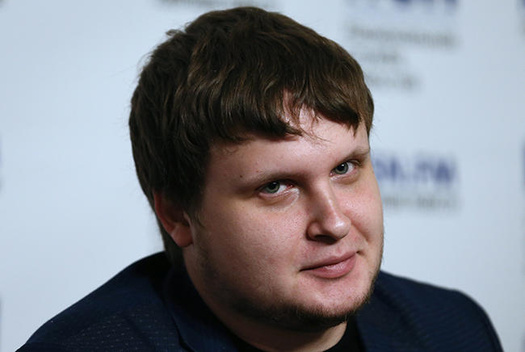
‘I’m a Surkov fan’
Why you are suspected of having links to the Federal Security Service [FSB] and the Kremlin?
Vovan: We overlap with [their] main media agenda. And that, apparently, means that the FSB has given us a mission.
Lexus: And the Kremlin. But then we need to be exact. Look, is Erdoğan the FSB’s business? This is surely the GRU [Russia’s Main Intelligence Directorate].
You often say that friends help you. It’s usually . . .
Vovan: FSBniki [slang for “FSB agents”].
I’m talking about something else. Are your sources friends or are you supplied with contacts anonymously?
Lexus: Lots of people like us, and they leak phone numbers to us. We won’t disclose their identities. Some say the FSB helps us with the phones numbers. Only, you know, the FSB has a slightly different function. Anyone who’s crossed their path knows that they work differently. They have to jump through a million hoops to get a single phone number. The security services are bureaucratized to such an extent that they won’t help us. And it’s the same in [the Kremlin], as far as I know. It moves very slowly. That doesn’t suit our activities.
So you think of yourselves as independent social activists?
Lexus: Yeah, I guess so. Why are [TV personality] Ksenia Sobchak, [rapper] Vasya Oblomov, and [TV journalist] Leonid Parfenov able to make something entertaining and funny and it’s today’s headline, but we can’t? Why do we immediately become agents of the Kremlin, and at the same time they aren’t agents of the US State Department? What we do can’t be done on state orders. The Kremlin doesn’t work that way.
And yet there is a sense that you are working the authorities.
Vovan: Yeah, it’s hilarious.
Lexus: Do you think that they’re using us? Well, I do not know. When they claim I’m with the FSB, I can claim they’re with the Department of State or [former oligarch, turned political dissident Mikhail] Khodorkovsky. There are people whose work dovetails with what the State Department does, and they don’t get paid for it. It’s the same with us. We don’t get paid for pranks.
It’s hard to believe that no one from the Kremlin or the [pro-Kremlin] youth movements has ever approached you.
Vovan: Honestly, they haven’t. Although it’s possible that someone from there gets money for us. Perhaps we have a supervisor in charge we don’t know about that reports above. I don’t discount this.
In a couple of years, we’ll see the correspondence in an Anonymous International leak.
Vovan: And then everything will be clear.
Lexus: I’m a [Vladislav] Surkov fan, especially his literary works, his lyrics with Samoilov. [In 2003, musician Vadim Samoilov released an album that included some lyrics written by Surkov.] I’m interested in his platform. After all, it basically led our country for a decade. A portrait of Surkov hangs in my kitchen. And next to it is a portrait of Putin. When I sit there, I look up at them and get inspired.
Do you know anyone from the pro-Kremlin movements?
Vovan: They were already done by the time we arrived on the scene.
You’re their biggest heroes, you know. I was once at a secret meeting where [the former Nashi leader and former Rosmolodezh head Vasily] Yakemenko told the audience that social networks are the next battlefield.
Lexus: There’s movement called “Network” [created by Nashi alumni in 2013], but it’s such shit! Today, you’ve got Rosmolodezh and [under it] Rospatriottsentr.
Vovan: Movements imposed from above never win anything.
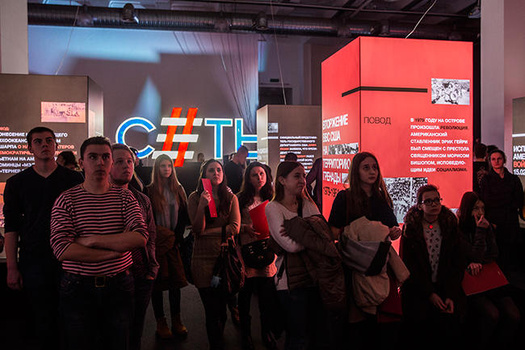
And no one from these movements has ever tried to work with you?
Vovan: Well, they have their own agenda. What do we need them for?
They need you.
Lexus: I know some of the leaders at Rospatriottsentra, but we are more influential than all of these movements.
Lexus orders a beer.
Vovan: The guy is drinking himself to death.
Lexus: Nobody ever cuts us any deals...
Vovan: The time for all these movements has passed. They were imposed from above, so they didn’t succeed. Everything was done under a budget, and everything was half-baked. We make our own project and don’t report to anyone.
Lexus: But it’s better if you write that we work for the FSB.
‘We’d be doing Yashin a favor if we pranked Kadyrov’
In an interview with Rossiiskaya Gazeta, you said that everything changed for you in 2012, when the mass protests started. And because of them you decided to do “socially meaningful” pranks.
Lexus: I was once a supporter of the oppositionist point of view. But then I became disappointed in them [the oppositionists]. They weren’t able to present themselves properly, so I looked in the opposite direction. Those people were more convincing. But everything changed for me even earlier, in 2010. Then I saw the incriminating videos with Shenderovich, Limonov, and Yashin. [A reference to a “honeytrap” staged to film opposition figures sleeping with a young woman named Katya Mumu, consuming illegal drugs, and, separately, offering traffic police small bribes.] And I thought, these people wanted to change the system, and here they looked even worse. An oppositionist must be inherently clean, a political Jesus Christ in every manifestation. I’m particularly very sympathetic to Alexey Navalny.
And so you wouldn’t prank him even once?
Lexus: It’s hard to get a recording of him. He went into defense mode after they hacked [his email in 2011]. Did you know that Navalny is afraid to drive because he believes that someone will throw themselves in front of his car? This is why he’s afraid to talk on the phone.
Vovan: But there’s another issue: What’s the point of pranking him? Where’s Navalny now? He had a chance, but he missed it.
Lexus: He had one opportunity when the protests began in 2011—to go out to the square and say, “I come alone, only Yura the Musician [Yuri Shevchuk] is with me and no one else.” And he would go out with [journalist Sergei] Parkhomenko, Nemtsov, [journalist Artemy] Troitsky, Sobchak . . . and Sobchak would disown the protest. [The billionaire Mikhail] Prokhorov could lead the protest with him!
Vovan: There’s a beast. He’s an oligarch.
Lexus: He’s better than the people they used to use. If Navalny went out only with Yura the Musician, then he would have succeeded. This is Surkov’s view.
Lexus orders another beer.
You haven’t called [opposition activist Ilya] Yashin, either.
Vovan: Who needs him? We aren’t even interested in Kadyrov, so there you go.
You’re not interested in Kadyrov?
Lexus: With Kadyrov, things are complicated. If we pranked Kadyrov, it would immediately be seen as some kind of sign. We would be doing Yashin a great favor.
Vovan: It’s a complicated story with Kadyrov. [Only] the president should decide that one.
Why is Kadyrov off limits for you?
Lexus: Trolling Kadyrov would be like trolling Putin. It would immediately destabilize the country. We don’t see the point in causing great harm. We would prank them, if they were friends with Navalny and Yashin—if they were on their side. We also wouldn’t call [Syrian President Bashar] al-Assad, because it would disrupt relations between our two countries.
We recently went to the march in Nemtsov’s memory. First, we were interested in seeing how it would go, and second, we don’t support murder in the shadow of the Kremlin.
Vovan: I personally hung out with Nemtsov a lot. I liked him.
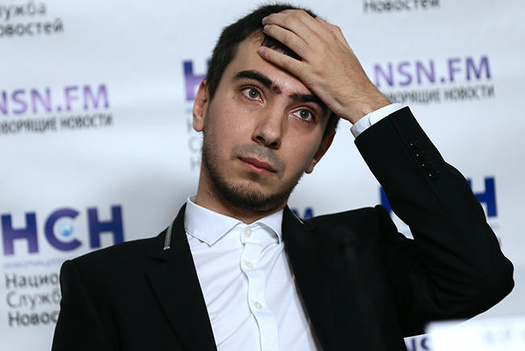
Before our meeting I listened to the recording you did with the prankster Demon, where you told Nemtsov that you wanted ”******* [to have sex] with his daughter.
Vovan: [Laughing, covering his mouth with his hand.] I didn’t say that. Demon did.
So now you think that was no way to speak to Nemtsov?
Vovan: Nemtsov took it in stride. We haven’t posted recordings with him even though he was quite frank when he talked to us. In general, I feel sorry for him. He was a very honest and direct. I believe that the people who did this should be punished, all the way up to the person who ordered it.
Lexus: I don’t like Nemtsov. He’s my enemy. He’s a corrupt official who failed in establishing a decent life for the country in the 1990s. But the fact he was killed in the center of Moscow is a shame for the people who are looking into this. But it’s unlikely that those who ordered the hit will be punished.
On another recording, you asked Nemtsov which of his daughters he “wouldn’t mind giving up for the sake of democracy.”
Vovan: We were trying to provoke him on the phone, so why not? The prank was to provoke a negative reaction, in order to get an emotional rise out of a particular famous person.
You repeatedly called Valeriya Novodvorskaya and tried her ruffle her feathers. You even pretended to be Anna Politkovskaya’s murderers.
Vovan: There’s a really funny recording when we called her as [Russian Children’s Rights Commissioner] Pavel Astakhov. Using his voice, we complained to Novodvorskaya that hooligans were calling him on her behalf. She told him about pranksters. As Astakhov, we said he’d catch us by illegal methods, beat us up, and more. She said, sure, that would be great. So democratic society has revealed its true face.
You say these calls are “provocations” and “an attempt to get an emotional rise out of people,” but then you started to act completely differently—you started trying to influence domestic events. It all started with the call to Churov... [In 2012, they phoned Vladimir Churov, then the head of Russia’s Central Election Commission, posing as presidential aide Arkady Dvorkovich, telling Churov that he’d been fired.]
Lexus: Our heyday, of course, came with the developments in Ukraine. Even before everything there, we’d pranked Ukraine’s main traffic cop, who gave out golden business cards. (If the GAI [State Automobile Inspectorate] stopped you, they would let you go if you showed them his card.) I called as Yanukovych’s son, saying, “Why are you dishonoring us? What are the golden business cards for?” There was another prank on [the self-declared chairman of the Novorossia parliament] Oleg Tsarev that was such a pisser that we’re now good friends and visit him. We have a long history with [Ukrainian oligarch Igor] Kolomoisky. Then there were calls to the United States [They spoke with General Kevin McNeely, posing as Ukrainian Interior Minister Arsen Avakov], and Moldova [They called the country’s president, posing as former Georgian President Mikhail Saakashvili]. In Ukraine, there are a lots of charismatic public figures, unlike in Russia, where there’s only [the deputy of the St. Petersburg Legislative Assembly, Vladimir] Milonov. That prank, by the way, exposed him completely. Now a sane person can no longer have any questions about him.
By the way, we were recently at an anniversary ceremony for Crimea [rejoining Russia]. And we got thanked by the Crimean leadership, by [chairman of the Crimean Council of Ministers Sergei] Aksenov, for the series of pranks about the electric transmission lines [In November 2015, Vovan and Lexus carried out what they called a “prank investigation,” where they identified the man who allegedly carried out the sabotage that’s caused mass power outages in the Crimea.] Aksenov told us that he’s a fan and offered us a plane to Moscow. [Crimean Prosecutor Natalia] Poklonskaya thanked us, too.
I also recently went to the Donetsk People’s Republic [DNR]. We were there, let’s say, to gather material with friends for a play. We came at the invitation of the republic, and even stopped by Novorossia-TV. DNR fighters escorted us to the airport. All of this was done through [the leader of the social-political movement Novorossia Pavel] Gubarev. We see each other often.
‘We can create news ourselves’
Right now, you’re in a fight with Mark Feygin, one of Nadiya Savchenko’s lawyers. He’s promised to have you criminally prosecuted.
Vovan: We saw him today [March 19]. He cursed at us and ran away.
What happened?
Lexus: We were having breakfast at the Kofe Haus at Park Kultury eating omelets. And we see Feygin sitting there talking about the Kremlin’s propaganda and about us. We’re sitting there thinking: “What a ****** [a stupid person].” We go up to him. He started ranting and raving, and then he ran away. Well, he left.
Can you blame him? Tell me how you planned the prank on Nadiya Savchenko.
Vovan: In the basement of the FSB, of course.
Lexus: We went to the Ostankino area on the monorail and read the top headlines on Yandex. As it’s almost always the case: we do things in waves. Journalists overlook things, and when you read the news, you have questions about the the people in the stories. But how do you ask them? If we were journalists, we would have presented ourselves as journalists, but we can’t ethically do this. Sometimes we can create the news ourselves. So we decided: why not prank Savchenko? We went home and started to brainstorm.
What did you two come up with?
Lexus: There were still FSB agents present. And so we started to think about what to do. Could we call her? We called her lawyer, Feygin, posing as the Poroshenko administration. We asked him if he was able to hand her the phone in her cell at an appointed time, and Poroshenko would personally call her. Feygin said it wasn’t possible. Then we realized we could write her a letter. I put up a question on Facebook: Were there any Ukrainian speakers? Eleven people responded in 30 minutes. We shot off the text of the letter to them, and an hour later, they shot back the translation, and we sent off the letter to Feygin. The next morning, he went to the jail and handed over the text to Savchenko. And all hell broke lose when Savchenko stopped her hunger strike. And that’s how we started a war with Feygin.
Vovan: You know, we ran into a freak with that one. He’s like a Gauguin Solntsev [the flamboyant showman and target of dozens of pranks].
Lexus and Vovan each order more beer.
‘We’re like the Russian security services’
Lexus: Do you know what’s the most amazing thing? When they say, “Where did they get the phone number of this president, and this one, and that one?” Well, gee I dunno. I guess you just need to use your brain, guys. People have these stereotypes about the KGB, about super-protected communications, but really it’s just that nobody ever tried to break through before.
And how do you manage to get them?
Lexus: Actually, we have our own security service: there are agents who don’t even know they work for us. I won’t say anymore. We’ve built long chains of contacts that eventually lead to the right person. In this way, we’re like the Russian security services. We have a network of agents who inform us and give us insiders. We make our own conclusions from these insiders and think further: how to cultivate more, what phone numbers do we still need, how to get them, and whom do we need to recruit?
How do you recruit someone?
Lexus: We convince them. Although we often don’t need to convince anyone. We go from the smallest person and higher and higher. Every one gives a little information, and that’s how we get as high as we need to. Before we get all the way to our target, we design something like a diagram showing the linkages between people. There was a chain of ten people to Erdoğan. We found this chain of people through conversations with the smallest to the biggest. In some ways, it’s the social-engineering principles used by Anonymous International. We’ve recently seen this with [presidential adviser on the Internet German] Klimenko, who’s complained that there is very weak protection of information in the Kremlin.
Even using these links, was there anyone you couldn’t get to?
Vovan: [The mathematician Grigory] Perelman.
Lexus: We had the idea to prank the Pope, but we put the brakes on it.
But Patriarch Kirill isn’t one of your targets?
Lexus: No, we also have a rule to not insult the feelings of believers. He would certainly be offended by the call. And we have never mocked religion. There’s no fun in it. We understand that many people have faith, and there’s no point in us doing it.
Vovan: Why don’t you call him and ask, “Why do you have a car wash in your church?”
Lexus: Why? Is that against the law or something?
Vovan: Eh, there’s definitely something off about it.
Lexus: Trolling the Patriarch is about sowing religious discord in our country. But, you know, we’d still really like to talk to Putin. And with Vladislav Surkov.
Vovan: Oh my!
And with Khodorkovsky?
Vovan: Does Meduza have his exact number? His press secretary guards him. But, really, he’ll just start talking about his time in the slammer. Who cares.
Aside from your “social” pranks, who’s your main target today?
Vovan: Artemych the drug addict [a popular victim of the pranksters], of course. And the FSB has a hit out on him. We got his number from some friends at the Federal Drug Control Service.
Lexus: Actually, talking with people like him is how we kick back and let off some steam. We call him when we don’t want to do serious “social” [pranks]. People ask us, what do you need Erdoğan for? Artemych is better. Some have now asked to get Artemych on the phone with Poroshenko. But we have long since outgrown the time when we could just be hooligans and giggle on the phone. We’ve outgrown ourselves.
Vovan: Have you heard about prankster who called judges and influenced their rulings? He did it in his own interests. This wasn’t a prank, and now the oppositionist media is making him out to be some hero.
Lexus: We, on the other hand, don’t do any pranks to benefit ourselves. We do it for society.
Lexus orders another beer.
What about Bogomolov? He disappeared, changed apartments and phones, he was found again and was called over and over. Isn’t this harassment?
Vovan: No. People were interested in him because he was the first one. These calls had no affect on his health. For the [victims], these calls are a unique interaction. The calls to “Speedfreak Grandma” [another popular victims in Russian prank calls] weren’t just to a pensioner, but were pointed attacks on corruption.
Do you work anywhere?
Vovan: In April, we’re getting our own show on a national TV network. It will be an informal talk show, with each episode dedicated to a single prank. We’ll invite experts to discuss it.
Is it on NTV?
Vovan: Well, I won’t say right now.
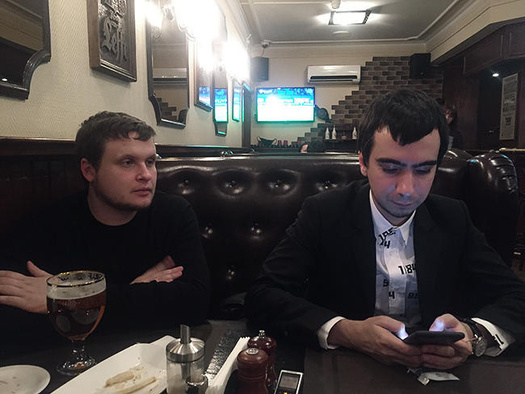
And this show will be your primary employment from now on?
Vovan: Yes. We’ll be working on fixed-term contract, not on the channel’s staff. Like it is for most people today. We need access to a large audience, so we need the TV. We won’t watch it ourselves, we will introduce the main part. Experts will come on as guests. Now we just need to write the pilot. It’s an adaptation of a foreign format.
Lexus: The channel’s management honestly really wants us. The program will run for 26 minutes, not counting commercials. We need to broaden our popularity, to do something more. We are also writing a book about all our activities. Pavel Gubarev has advised us to write it and send to Piter publishing, where he publishes books.
Lexus orders another beer.
How will you play a ten-minute audio recording on television? This never happens.
Lexus: It will.
It sounds a bit like the story of “Sveta from Ivanovo,” another online personality they put on the air. But she failed.
Vovan: We aren’t online personalities. All of our recordings nearly always crossover into the news media. LifeNews paid us for an exclusive. Well, we sold them our stuff. It wasn’t any kind of propaganda. It was just a small honorarium.
Lexus: We don’t get any royalties.
Vovan: The FSB
Lexus: The FSB pays more.
Vovan: Yeah, in dollars.
Lexus: Oh, I get paid in rubles.
* * *
Ten minutes later, we go out into the street. Lexus is drunk and staggering. Vovan is embarrassed by his state.
“Where are you going?” he asks me.
“To the metro.”
“Ah. And we’re now going to Lubyanka, of course,” he jokes.
“They don’t work at night!”
“They’re always working, always listening to everything,” he says.
The text was translated from Russian by Sean Guillory.
Daniil Turovsky
Moscow